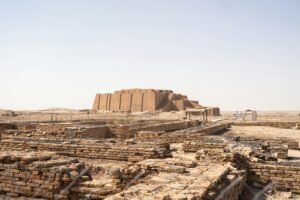Ahab & Micaiah: Contrary Truths
It’s quite normal for children to be restless, right? Brimming with barely restricted energy and almost vibrating with the desire to do something, or go somewhere, touch this and feel that, or even make one thing and break another. In children, it’s expected, and so it’s not entirely unusual. But have you ever met an adult who was naturally restless? Someone who couldn’t sit still for more than 5 seconds and always had to be doing or saying something, useful and otherwise. Well, I can tell you for free, it’s exhausting trying to keep up with people like that, and unfortunately they usually end up leaving a bunch of poorly thought-out, half-finished ideas in their wake, because they get bored with things quickly and lack the focus required to properly execute whatever plans they cook up. Now, imagine that kind of person, and then try to imagine them being in a position of power or authority. Some of us don’t even need to imagine, because we’re currently living in it and it’s not a pretty picture at all.
Today, we’re going to be discussing someone who, unfortunately, had to deal with one of these restless people, and then, the restless human himself.
Remember the king the Bible hailed as being more wicked than all his predecessors? The one the prophet Elijah was always giving back to back curses? Yeah, that’s the one. His name was Ahab, and he was a restless human being. The worst type of restless human being, in fact, because it was so bad that he recruited others to be restless with him. How do I know this? Don’t worry, I’ll show you. It’s in the same Bible we all read, or at least, the Bible we are supposed to be reading. So in case you’ve forgotten what your Bible looks like, now’s the time to find it so that you’ll understand what we’re talking about. But let’s get right to it.
The very first time we meet Ahab in the Word, he’s just taking the throne and beginning his rule as King of Israel (1 Kings 16:29). The Bible tells us that he resigned for twenty-two years as king, in Samaria. All well and good so far, right? But in the very next verse, the next line in Ahab’s introduction was about how he was the GOAT when it came to doing evil (vs. 30). In fact, it was so bad that he surpassed all who had come before him. Just how evil would someone have to be to win the gold medal in the Wickedness Olympics? It was almost like he had taken his time to study the wickedness of his ancestors, so that he could know how to exceed their expectations during his own time. He started from leading the Israelites to worship false gods, like his forefather Jeroboam (1 Kings 12:33-36), then he upgraded his sin by marrying Jezebel, who came from a pagan family that was also contending for the award of Most Wicked (1 Kings 16:31). Like that one was still not enough, he adopted Baal unprovoked, started worshipping this baal and then built him a fully furnished temple inside the same kingdom that God had given him to rule (vs. 32). The utter recklessness of his actions surprises me every time I think about it. Some people really have mind in this life sha. Especially since those were the days when you could stretch a healthy hand and draw it back shriveled up and useless if you did anyhow (1 Kings 13:4).
But anyways, Ahab was wicked, and we saw it time and again in his dealings with Elijah. But it wasn’t just Elijah that Ahab frustrated with his actions. You see, there was an almost constant war between Israel and Syria while Ahab was king. But then, there was a period, a 3-year gap, where there was peace in the land. During this time, Ahab was visited by his fellow King and friend, Jehoshaphat (1 Kings 22:1-2). Now, here’s where we can see another episode of that restlessness I told you about earlier. You know how you’re casually talking to your friends and you people start remembering things that should honestly have been left forgotten? That’s what happened here, but as usual, Ahab went the extra mile with his own. So Jehoshaphat, King of Judah, and Ahab, King of Israel, were talking, and Ahab now remembered one piece of land that “belonged” to him, and was telling Jehoshaphat that he wanted to go and “collect” it from Syria (1 Kings 22:3-4). Mind you, this is why it’s good to have friends that can drag your ears and talk sense into your head, regardless of who you are. Because if Jehoshaphat had done that, everybody would have had peace. But no, this oga volunteered not only himself, but also his men and horses for service.
To be fair though, Jehoshaphat did advise Ahab to seek God’s will in this their nonsense plan. When Ahab agreed and gathered the prophets, all 400 of them were saying the same thing (vs. 5-6). They told him to go, that he would be victorious, and would reclaim the land. Ahab must have been happy with that, after all who doesn’t want to hear that they would succeed? But it was almost as if Jehoshaphat didn’t want to go, he just didn’t want to be the one to say so, because he now asked Ahab if there was no other prophet of God around. 400 people had told you the same exact thing, and you still wanted to confirm? But I think perhaps, that in Jehoshaphat’s hesitation we still see a glimpse of God’s mercy towards him, and even towards his wicked friend who just wanted to cause trouble when nobody sent him. Either way, he asked for someone else and Ahab grudgingly complied. The only problem was, this last prophet was Micaiah (1 Kings 22:7&8). Micaiah and Ahab were not pals, in fact Ahab hated him because Micaiah did not rate Ahab as a person, much less a King, and has absolutely no problems with prophesying retribution and doom to him for all the bad things he had done (Vs 8). Kind of like Elijah. But regardless, Ahab brought Micaiah over and asked him if he should go and conquer the land. Now on his way to see the King, Micaiah had heard the gist of what was going on in the King’s presence. He knew what the prophets had told him, but he was committed to saying only what God told him to say (Vs. 13-14). But when the king asked him, Micaiah initially answered in the same vein as all the other prophets. The issue with that was, the others had prophesied victory and that was contrary to what Micaiah would normally say, so his initial agreement told Ahab that something was wrong with what he had been told. This was where the problem started. Ahab now insisted on hearing the truth from Micaiah, and eventually, he complied. Unfortunately, the truth was not favourable to the King, because not only did he foretell doom to the King’s army, but also exposed the other prophets as speaking with a lying spirit (1 Kings 22:17-23). Ahab flew into a rage, shouting, “Did I not tell you?” up and down. And one of the best ther prophets even slapped Micaiah for speaking about them like that. But Micaiah stood firmly by the revelation God had given him, even as Ahab had him thrown into prison and treated unfairly. He told Ahab that if what he prophesied did not happen, then he would return and everyone would know that God had not spoken through Micaiah (1 Kings 22:24-28).
Ahab went to fight his battle, Jehoshaphat followed him (I genuinely still cannot understand why, with all the evidence on ground) and just as Micaiah said, it ended in premium tears for the armies of Israel and Judah. Ahab was badly wounded in the battle, and ended up dying that very same day (Vs. 29-37). Jehoshaphat barely escaped with his life, because the Syrians thought he was the king of Israel as Ahab was disguised in battle. So he too, suffered for his folly (Vs , 30-32), but the Word of the Lord through Micaiah came to pass.
I wonder what happened to the 400 prophets after that battle, when they realised that indeed they had spoken with a lying spirit in their eagerness to please the king. I don’t know if they meant to lie to the king intentionally, but their desire to please him put them in the prime position to be misled. So what might have seemed like the truth, because it was convenient and beneficial to them, turned out to have been a lie spoken in the presence of the people. Any credibility they held as prophets would have been shot to pieces, and I’m sure they would have had questions within themselves too. But Micaiah, now he would have been able to raise his head in confidence. His lack of concern with things that pleased the king, and the fact that he feared the Lord above all else, had helped him guard the truth in his heart and at the end of the day, he was justified and vindicated.
Sometimes we make the wrong decisions in our lives as believers, not because we want to be bad, selfish or wicked, but simply because in that particular moment our desire to gratify ourselves outweighs our love for God. Sometimes it may be because we want to please someone, or even because we do not want to offend them, so we alter the facts and bend reality to suit the situation. Today we see the importance of the truth, the real truth, and not just our version of the truth. It’s one thing to not know, but it’s a separate thing altogether to not heed. Ahab had the opportunity to hear the truth about his future, and yet he chose to disregard it. As children of God, the truth is presented to us every day, in every way, through the Scriptures, and God has called each of us to know that truth so that we can really walk in the freedom of life that Christ died to give us. In John 18:31&32, Jesus tells the Jews that if they continued in His Word, they would know the truth, and it would set them free. So the Word of God manifested in Christ and in the Scriptures have the power to keep us in truth, both within our own hearts and in our daily life. If we know the value of God’s Word, the valid truths contained therein and the power the Word can have in our lives, it could literally change everything.
So what do we do when our hearts tell us one truth, but the Word of God tells us another? The book of Proverbs warns us to trust in the Lord with all our hearts, and lean not on our own understanding (Proverbs 3:5-6), precisely because of this. Our hearts are typically controlled by our emotions, but because we know that these emotions are fickle and change with the wind, we cannot trust the truth of our feelings. We can, however, trust the truth of God’s Word in Christ Jesus, and His Spirit in our hearts and lives, like Micaiah did. When we decide to make God our Father by accepting Christ and the gift of salvation, God puts His very own Spirit within us, and nobody tells you the complete, unadulterated truth like the Holy Spirit. He can help you discern between the actual truth, and what you want the truth to be, because He’s the original Spirit of Truth. And so can the Word of God. So every time you come up with a conviction, check it. Test it against the Word, and ask for help from the Holy Spirit. Be careful not to immediately agree with some idea or proposal simply because it appears to be true, or because you feel it is. God has given us tested and trusted ways to verify truth, and we would be wise to utilise them.
Remember the price Ahab paid for going with the version of Truth he preferred, just as Proverbs 14:12 warns,
“There is a way which seemeth right unto a man, But the end thereof are the ways of death.”
And then look to the vindication of Micaiah for deciding to remain steadfast in God’s own truth.
As we journey through life on our way to eternity, Christ urges us to look to Him, the greatest expression of God’s Truth and Mercy on this earth, and rest assured that in Him we have all we need to remain in the will of God for our lives.
Calvary Greetings from my heart to yours,
Gabrielle…







